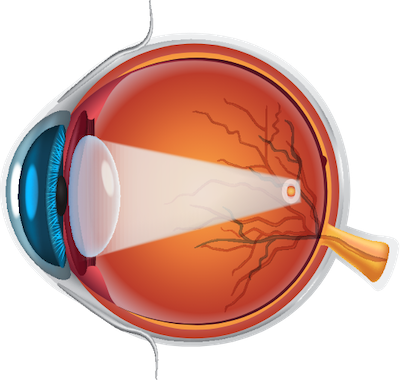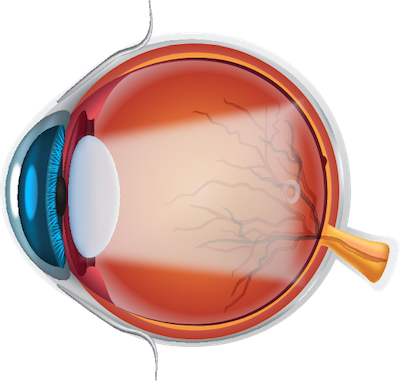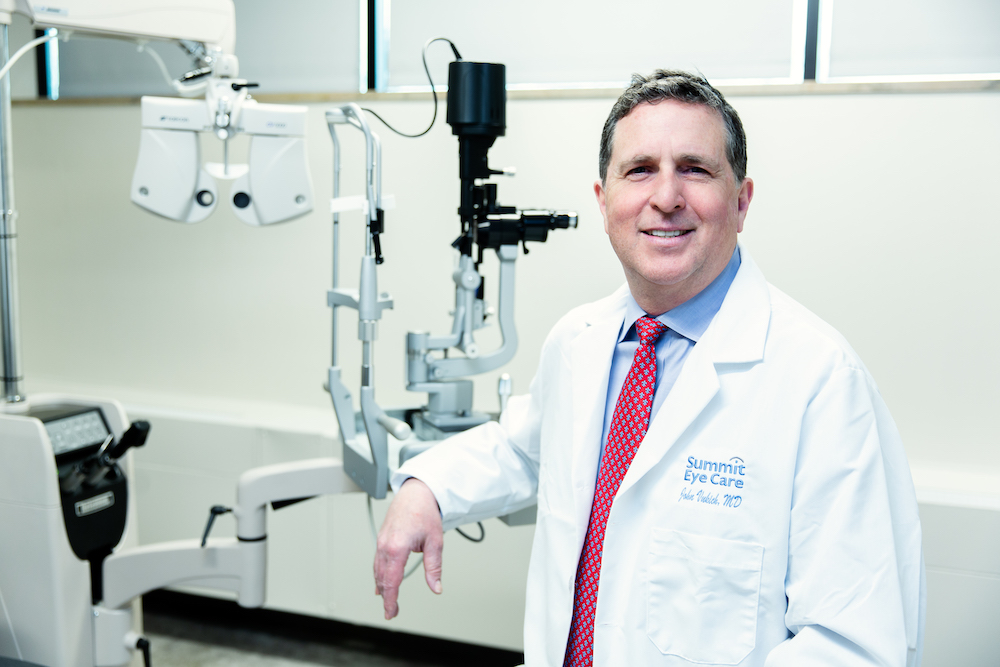Last updated: March 31st, 2025
At Summit Eye Care, our vision care experts are the recognized leaders in cataract removal surgery for the Milwaukee area.

Led by Board-Certified Eye Surgeon Dr. John Vukich, we take pride in providing the most technologically advanced eye care available in an environment designed to promote our patients’ comfort and confidence.
What are Cataracts?
A cataract is the result of the accumulation of proteins on the inner lens of the eye, located behind the iris (the colored part of the eye). Eventually, this protein buildup causes the lens to become cloudy. A healthy, clear lens focuses light onto the retina at the back of the eye to produce sharp images. A lens affected by a cataract, however, filters light much in the same way a dirty window does, letting less light through. This is why a person with cataracts experiences vision that is described as hazy, cloudy, or generally dim.
Normal Eye

Eye with Cataracts

What Causes Cataracts?
In the majority of cases, cataracts are a natural result of the aging process. There are, however, some factors that may increase a person’s likelihood of developing cataracts, such as:
- Genetic predisposition
- Smoking
- Excessive alcohol consumption
- Previous eye injuries or surgeries
- Exposure to excessive sun, ultraviolet light, or radiation
- High blood pressure
- Nearsightedness
- Certain medications, including steroids
- Diabetes
What are the Symptoms of Cataracts?
Patients rarely report early symptoms of cataracts, mainly because the clouding of one’s vision is typically so gradual that it goes unnoticed until a cataract has progressed to a more advanced stage. Common symptoms of cataracts often include:
- Blurry, dim, or cloudy vision
- Sensitivity to light or glare
- Growing difficulty with nighttime vision
- Seeing “halos” around lights
- Need for increasingly brighter lighting for reading
- Yellowing or fading of colors
- Frequent changes to prescription for glasses or contacts
- Double vision in one eye

How are Cataracts Treated?
Because cataracts are a progressive condition, they will continue to worsen over time. The only permanent way to reverse the vision impairment caused by cataracts is to have them surgically removed. During surgery, the diseased natural lens is removed and replaced with an artificial intraocular lens (IOL). At Summit Eye Care, our team offers a variety of IOL options, many of which can help reduce or eliminate the need for corrective eyewear after surgery by correcting astigmatism and vision at all distances.
What Kind of IOLs are Available for Cataract Surgery?
Standard (Monofocal) IOL
Standard IOLs correct vision at a single distance. This means that in addition to correcting blurry vision from cataracts, they can correct near vision or distance vision—but not both. Patients who undergo cataract surgery with standard IOLs may still need corrective eyewear for some tasks or to treat astigmatism. While the cost of standard IOLs is covered by insurance, many patients opt to incur out-of-pocket costs to invest in advanced IOLs that can correct vision at a range of distances and give them their best opportunity for visual freedom.
Astigmatism-Correcting IOLs
Toric IOLs correct astigmatism by compensating for the cornea’s irregular shape, improving vision clarity at all distances. These lenses address both cataracts and astigmatism in one procedure, reducing dependence on glasses or contacts.
Presbyopia-Correcting IOLs
These lenses help improve vision at multiple distances, reducing the need for reading glasses. By addressing age-related focusing issues, they offer greater visual flexibility for daily activities.
Extended-Depth-of-Focus (EDOF) IOLs
EDOF IOLs provide a continuous range of vision from distance to intermediate and near, enhancing depth of focus while minimizing glare and halos. They create a smoother transition between focal points for a more natural visual experience.
The Light Adjustable Lens™
The Light Adjustable Lens™ by RxSight® is a revolutionary IOL that allows for non-invasive, post-surgical adjustments to fine-tune vision after the eye has healed. Made from a special photosensitive material, the LAL can be precisely modified using ultraviolet (UV) light treatments, enabling personalized vision correction. This customization process enhances the likelihood of achieving optimal visual outcomes, potentially reducing or eliminating the need for glasses.
Selecting the appropriate IOL is a crucial step in your cataract surgery journey. Our team at Summit Eye Care is dedicated to guiding you through this process, ensuring that your choice aligns with your visual goals and lifestyle preferences. For a comprehensive discussion tailored to your specific needs, please schedule a consultation with our experienced ophthalmologists.
Preparing for Cataract Surgery
If you are experiencing the symptoms of cataracts or have been diagnosed with cataracts, the first step in preparing for surgery is to schedule a consultation with an experienced ophthalmologist to discuss your options and plan for your cataract procedure. Your surgeon may ask you to use certain eye drops before your procedure, and you may also be asked to refrain from eating on the day of surgery. Since you won’t be able to drive yourself home after the procedure, you’ll need to enlist the help of a friend or family member for transportation on the day of surgery.
Cataract Surgery – What to Expect
Cataract surgery is an outpatient procedure that generally lasts about 15-20 minutes. Prior to surgery, the eyes will be numbed using anesthetic eye drops, and patients may be given an oral sedative to help them relax.
Once your eyes are numb, the doctor will create a tiny incision and break up and remove the cloudy lens. A clear intraocular lens implant (IOL) will then be placed between the iris and the pupil. The incision for cataract removal surgery is so small that no sutures are required.
Following cataract surgery, you’ll have a protective shield taped over the affected eye. After a very brief recovery period, you’ll be ready for a friend or family member to drive you home.2

Recovering from Cataract Surgery
After cataract surgery, you’ll be instructed to rest and keep the protective shield over your eye for at least several hours. You should tape the shield over your eye for protection while sleeping or napping for the first few days after your procedure.
Your doctor will prescribe eye drops to prevent infection and reduce inflammation following cataract surgery. It is important to apply these drops according to your doctor’s recommendation. In some cases, a dropless cataract surgery option may be available, eliminating the need for post-surgical eye drops.
Your eye may feel itchy or slightly uncomfortable for the first few days after your cataract surgery. This is normal and can be treated with over-the-counter medication. Try not to rub or touch your eye! It is normal to experience blurred, distorted, or cloudy vision immediately after cataract surgery. This will continue to improve as the eye heals.
Most patients are able to resume most of their daily activities in as little as 24-48 hours, and patients can typically drive the day after surgery. Avoid high-impact activities for at least a week, avoid swimming for two weeks, and be careful to protect your eyes from dust or sand. You should notice a dramatic improvement to your vision within just a few days, but it may take several weeks for the eyes to completely heal and to achieve the best long term vision outcomes.
-
How are cataracts diagnosed?
Cataracts are diagnosed during a dilated eye examination, which includes a number of diagnostic tests. First, sophisticated diagnostic machines allow your surgical team to measure and analyze the interior structures of your eye digitally. Second, visual acuity and refractive testing will help your doctor diagnose any vision impairment. Next, a slit-lamp examination will allow the doctor to see the internal structures of the front of your eye in great detail. Finally, your eyes will be dilated for a retinal examination.3
-
Can I prevent cataracts?
It is not possible to prevent cataracts, but there are steps you can take to delay their progression and keep your eyes healthy, such as:
- Protect your eyes from the sun with sunglasses or a hat
- Eat a healthy diet with lots of dark, leafy greens
- Stop smoking
- Have regular dilated eye examinations every two years after the age of 60
-
How common are cataracts?
Cataracts are very common. In fact, more than 20.5 million Americans over the age of 40 are currently affected by cataracts. More than half of all Americans over the age of 80 have been diagnosed with cataracts or have already undergone cataract removal surgery.4
-
Am I a candidate for cataract surgery?
Cataracts can only be treated surgically, but many patients are able to delay cataract surgery until their vision has become significantly impeded. You may be a good candidate for cataract surgery if:
- You continue to experience subpar vision despite updating your glasses or contact lens prescription
- A decline in your night vision has made it difficult to drive after dark
- Cataract symptoms such as blurred vision or muted colors trouble you
- Everyday tasks such as reading have become difficult for you
-
What is dropless cataract surgery?
Dropless cataract surgery is a technique that eliminates the need for post-surgical eye drops by delivering medication directly into the eye during the procedure. This option simplifies recovery and reduces the risk of missing doses, though it is not suitable for all patients.
-
What are the risks of cataract surgery?
Cataract surgery is one of the most common and medically trusted surgical procedures performed in the United States. Especially when conducted by an experienced ophthalmologist like Dr. Vukich, cataract surgery complications are rare. Still, as with any surgical procedure, cataract surgery does carry some risks, which include:
- Infection
- Vision loss
- Post-operative pain
- Swelling of the eye or retina
- Retinal detachment
- Eye damage
- Shifting of the IOL5
-
How much does cataract surgery cost?
Medicare and most private insurance plans cover the cost of cataract surgery once a person meets certain age and vision requirements. While most plans do cover cataract surgery, there may be additional costs for patients who opt for advanced IOLs.
At Summit Eye Care, we believe that clear vision should be within everyone’s reach. If your full treatment is not covered by insurance, we can help you explore options for financing and payment plans.
Meet the Leading Providers of Cataract Surgery near Milwaukee
The best way to determine whether it’s time to undergo cataract surgery is to have a candid discussion with an eye doctor you trust. As an internationally-recognized expert in vision care, Dr. Vukich is honored to be a leading provider of cataract removal surgery in the Milwaukee area. He and the team at Summit Eye Care are ready to answer all of your questions so that you can make an educated, confident decision about your eye care. To learn more about your cataract surgery options, please contact us for a consultation at our practice in Wauwatosa.

1 Mayo Clinic. Cataracts. Available: https://www.mayoclinic.org/diseases-conditions/cataracts/symptoms-causes/syc-20353790. Accessed April 13, 2020.
2 American Refractive Surgery Council. Cataract Surgery with Vision Correcting IOLs. Available: https://americanrefractivesurgerycouncil.org/refractive-surgery-procedures/cataract-surgery-with-vision-correcting-iols. Accessed April 13, 2020.
3 Mayo Clinic. Cataracts Diagnosis. Available: https://www.mayoclinic.org/diseases-conditions/cataracts/diagnosis-treatment/drc-20353795. Accessed April 13, 2020.
4 National Eye Institute. Cataracts. Available: https://www.nei.nih.gov/learn-about-eye-health/eye-conditions-and-diseases/cataracts. Accessed April 13, 2020.
5 American Academy of Ophthalmology. Cataract Surgery. Available: https://www.aao.org/eye-health/diseases/what-is-cataract-surgery. Accessed April 14, 2020.